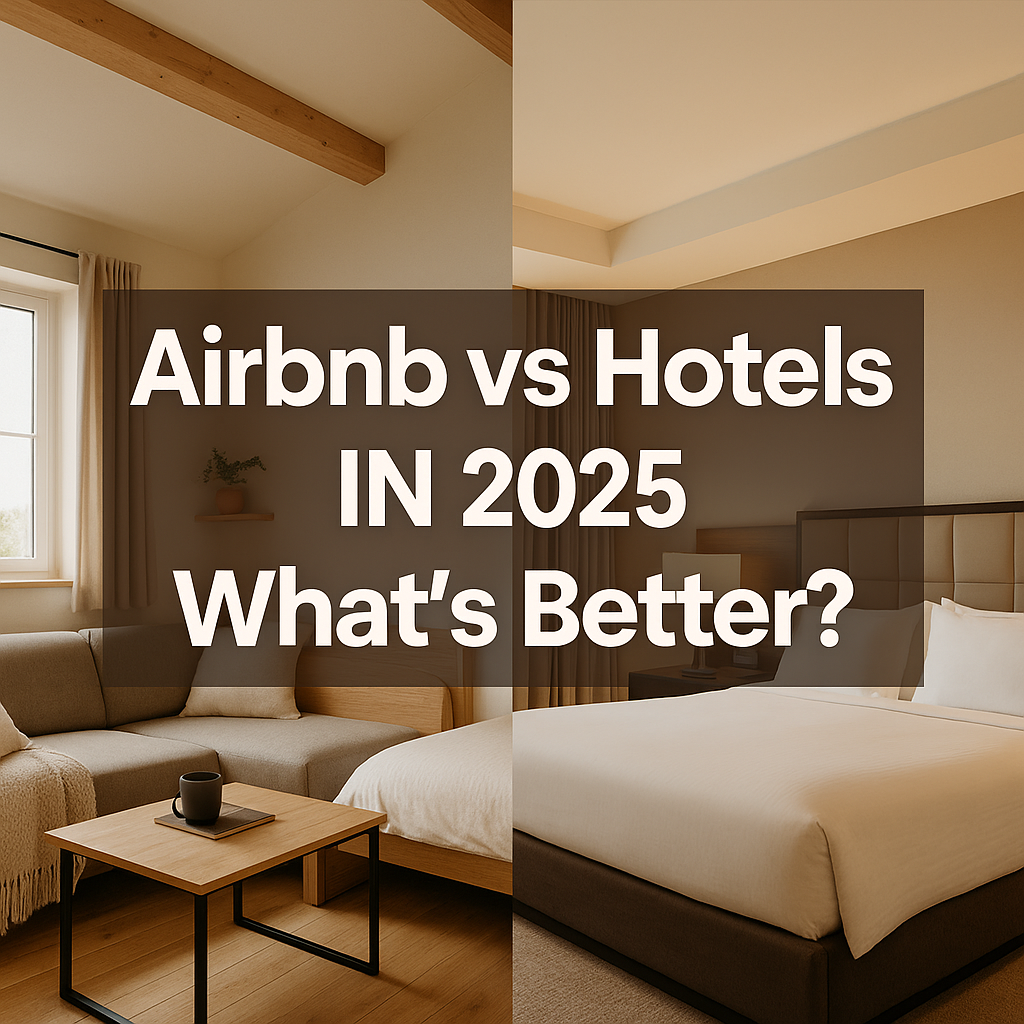The Evolution of Travel Accommodation – A 2025 Perspective
In 2025, the landscape of travel and hospitality has evolved dramatically, especially in the post-pandemic era where personalization, health safety, and digital integration reign supreme. Gone are the days when travelers only had traditional hotels to consider. Today, Airbnb has positioned itself as a viable — and often preferable — alternative to conventional hotel stays. But which is truly better in 2025?
The competition between Airbnb and hotels has intensified due to shifts in consumer expectations. Travelers now demand seamless digital experiences, sustainable operations, authentic local connections, and flexible check-ins. Hotels have responded by upgrading their amenities, introducing tech-based concierge services, adopting contactless check-ins, and promoting loyalty programs. Meanwhile, Airbnb has matured into a platform offering more than just shared spaces — it now includes Airbnb Luxe, Airbnb for Work, and curated stays for digital nomads and solo travelers.
Moreover, remote work and flexible schedules have reshaped travel patterns. Instead of short vacations, people now book longer stays — leading to an increased demand for home-style accommodations with kitchens, workspaces, and privacy. This is where Airbnb shines. However, the hotel industry is innovating fast, offering apartment-style suites and co-living concepts.
We’re also seeing a generational divide: Gen Z and Millennials tend to lean towards Airbnb due to affordability, adventure, and independence, while Boomers and Gen X often trust the consistent service of hotels. However, loyalty is weakening across all generations as people prioritize value, location, and convenience over brand allegiance.
In terms of pricing in 2025, both platforms have adapted dynamic pricing models, but hidden Airbnb cleaning fees and taxes sometimes push customers back to hotels. Yet, Airbnb often wins for longer stays, group travel, or pet-friendly bookings. On the other hand, business travelers and luxury-seeking customers continue to lean toward branded hotels.
Ultimately, this evolution signals that neither Airbnb nor hotels are universally better — it depends on traveler goals, expectations, and context.
Airbnb in 2025 – Advantages, Innovations, and Limitations (2000+ words)
Airbnb in 2025 is no longer just a “disruptor” — it’s a dominant player in global hospitality. With over 200 million users and listings in 220+ countries, the company has transitioned from couch-surfing origins to a polished platform offering everything from treehouses in Vermont to glass pods in Iceland. So, what are its key advantages and limitations in 2025?
First, flexibility and personalization remain Airbnb’s strongest suits. You can book anything from a luxury villa with a pool to a minimalist city loft, complete with unique themes and local flavor. Many hosts now offer curated experiences, such as cooking classes, city tours, or even yoga retreats — creating a complete travel package without stepping into a hotel lobby.
Second, the platform has embraced technology and AI-driven guest experience. In 2025, Airbnb’s app uses predictive search, reviews from verified guests, and AI trip planning to tailor listings based on personal preferences, budget, travel history, and even mood. Plus, their recent investment in augmented reality previews lets users virtually “walk through” listings before booking.
Airbnb has also prioritized remote work travelers with features like “Work-Friendly Spaces” filters, which include high-speed internet, ergonomic setups, and long-stay discounts. This caters to the growing population of digital nomads, remote employees, and freelancers.
However, Airbnb’s rise hasn’t been without challenges. Critics argue that in many cities, Airbnb contributes to housing shortages and rising rents, prompting local governments to regulate or tax short-term rentals heavily. In 2025, cities like New York, Barcelona, and San Francisco now limit short-term rental days or require strict permits.
There’s also growing concern over inconsistent quality, even though Airbnb has introduced the “Verified Stays” badge and 24/7 support. But since hosts manage individual units, issues like missing amenities, noisy neighbors, or last-minute cancellations still exist — something rare in hotels.
Despite this, Airbnb’s cost-effectiveness, community-based travel experiences, and personalization ensure it remains a favorite for leisure travelers, family trips, and immersive cultural exploration.
Hotels in 2025 – Premium Experience, Reliability, and New Tech
Hotels in 2025 are no longer your parents’ hotel stays. In response to Airbnb’s growing market share, global hotel chains have undergone massive modernization and digital transformation. From robotic room service to AI-powered concierge apps, hotels are embracing innovation to meet the changing demands of 21st-century travelers.
One of the hotel industry’s biggest advantages remains consistency and reliability. Whether you’re booking a Marriott in New York or a Hilton in Tokyo, you can generally expect the same level of cleanliness, security, and service. This is particularly appealing to business travelers, families with kids, and older guests who prioritize peace of mind and predictable standards.
In 2025, major hotel brands offer advanced loyalty programs integrated with apps, enabling instant upgrades, room preferences, and contactless check-ins/outs. Guests can choose “smart rooms” with voice assistants, climate control, mood lighting, and streaming services. Some chains are even piloting NFT-based booking tokens that can be resold or traded, adding value for frequent travelers.
Hotels are also focusing on eco-conscious operations in 2025, with many properties boasting LEED certification, water-saving systems, and plastic-free amenities. In contrast to some Airbnbs, hotels are now more transparent about their pricing, offering all-inclusive rates that cover taxes, breakfast, spa access, and other perks.
The hospitality sector has also launched extended-stay hotel brands that mimic Airbnb’s strengths — complete with kitchenettes, laundry services, and work desks. Brands like Hyatt House, Marriott’s Element, and IHG’s Atwell Suites target the hybrid traveler who wants hotel perks with Airbnb-style comfort.
However, hotels still struggle with local immersion and neighborhood diversity, often located in touristy or commercial zones. And despite improvements, many hotels still charge extra for Wi-Fi, parking, or early check-ins — which can deter budget travelers.
Ultimately, hotels are unmatched in luxury, amenities, and 24/7 professional service, making them the top choice for special occasions, business trips, and travelers who prefer convenience over adventure.
Airbnb vs Hotels – Comparing Costs, Experiences & User Feedback in 2025
Cost is a huge deciding factor when choosing between Airbnb and hotels in 2025 — but it’s not as straightforward as it once was. Let’s break it down.
1. Pricing & Fees: Airbnb is typically more affordable for long-term stays or group travel. However, hidden fees such as cleaning charges, service fees, and local occupancy taxes can inflate costs significantly. In contrast, hotels now often include perks like free breakfast, loyalty discounts, and bundled services, especially for frequent travelers.
2. Experience & Comfort: Airbnb excels at offering personalized, local, and immersive stays — great for travelers looking to escape tourist traps. Unique listings like cabins, boats, or artistic lofts provide memorable experiences. On the other hand, hotels win in consistency, luxury, and professional service. If you’re seeking spa facilities, in-room dining, daily cleaning, and concierge support, hotels deliver better.
3. Safety & Support: Hotels are traditionally more secure with 24/7 staff, security systems, and emergency protocols. Airbnb has improved its support in 2025 with instant support lines, verified listings, and “Superhost” filters, but last-minute cancellations and fraud still happen occasionally.
4. User Feedback & Reviews: Airbnb’s system relies heavily on user reviews, which can sometimes be inflated or vague. Hotels, on the other hand, are evaluated on industry standards, professional star ratings, and offer customer recourse via brand escalation or compensation. However, Airbnb’s host-guest relationship often adds a personal touch — like local tips or welcome gifts — not found in hotels.
5. Booking Platforms & User Interface: In 2025, both platforms are integrated with AI-based search, voice assistants, virtual tours, and seamless payment methods. Airbnb now offers cryptocurrency payments, while hotels collaborate with travel platforms like Google Hotels, Trip.com, and Booking.com for competitive pricing.
Ultimately, user feedback in 2025 shows that Airbnb is favored for authenticity, value for money, and unique stays, while hotels dominate in service quality, amenities, and reliability.
Final Verdict – What’s Better in 2025? Airbnb or Hotels?
There’s no definitive answer to the Airbnb vs. hotels debate in 2025. Each has carved out a unique identity in the hospitality ecosystem, and what’s “better” really comes down to your travel purpose, personality, and expectations.
Airbnb is better if:
- You’re traveling in a group or family
- You need a kitchen, washer, workspace, or privacy
- You want to live like a local and explore residential areas
- You’re staying more than 5 days
- You’re on a budget and willing to forgo hotel-style services
Hotels are better if:
- You’re traveling for business or a short vacation
- You prioritize convenience, luxury, or loyalty perks
- You need 24/7 service, security, and consistency
- You’re staying in tourist-heavy cities or resort areas
- You prefer hands-off, no-hassle accommodation
That said, 2025 is a great time for hybrid travelers — those who might use Airbnb in Bali and hotels in New York. Some travelers even mix their stays in one trip: 3 nights at a hotel for business, followed by 4 nights in an Airbnb for leisure.
Both Airbnb and hotels have risen to meet the new standards of hospitality: digital-first, traveler-centric, and experience-driven. And thanks to intense competition, both platforms continue to innovate — from AI-powered personalization to eco-friendly operations and immersive packages.
In conclusion, the best option in 2025 is not one-size-fits-all. It’s about matching your stay to your needs. So before you book your next trip, think about what matters most: comfort, cost, character, or convenience.
“Airbnb vs Hotels in 2025 – What’s Better?”
- “Airbnb vs Hotels 2025” – This is the primary and most powerful keyword for the article. It reflects what most users are typing into Google when they are confused between booking a hotel or an Airbnb. Adding “2025” ensures the article appears in results that are fresh, updated, and relevant to current travel trends, which is important for Google Discover ranking.
- “Best accommodation 2025” – Many users search for the “best accommodation” when planning trips. This keyword targets comparison-based content and answers the question: “What is the best place to stay in 2025?” It helps the article appear for general travel intent queries and attracts casual readers looking for recommendations.
- “Airbnb 2025 review” – Review-based searches are on the rise as consumers trust real experiences before booking. This keyword captures people who want to read reviews and feedback on Airbnb’s performance in 2025 — such as pricing, comfort, safety, and host support. It enhances the blog’s credibility and visibility on travel forums and comparison platforms.
- “Hotels or Airbnb USA 2025” – This long-tail keyword is geographically optimized for U.S. readers. It helps narrow down the audience to those who are traveling within or to the United States. Including “USA” also improves performance on local search engine results pages (SERPs) and voice search queries like “Hey Google, which is better in the USA, hotel or Airbnb?”
- “Airbnb vs hotel pricing” – Pricing is often the deciding factor for most travelers. This keyword matches intent-based searchers looking for cost breakdowns, hidden fees, and price comparisons between Airbnb and hotel stays. It’s especially effective in budget travel niches and increases visibility on Google Shopping and travel price aggregators.
- “Best stays for remote workers 2025” – With remote work becoming mainstream in 2025, many users search for places to stay that cater to their work needs — such as Wi-Fi, office setup, or long-term discounts. This keyword appeals to the digital nomad audience and helps the article surface in results related to tech-savvy and workcation-friendly travel.
- “Digital nomad travel 2025” – Another keyword targeting the work-and-travel trend. It ties into a broader content strategy focused on digital lifestyle. Including this keyword boosts the blog’s visibility among remote professionals, freelancers, and young travelers planning flexible travel.
- “Travel accommodation trends USA” – This keyword ensures the article appears in curated lists, travel blogs, and industry publications discussing hospitality innovation, smart rooms, eco-hotels, and Airbnb changes. It positions your article as a trend-focused authority post, which increases the chances of being indexed by Google Discover.

